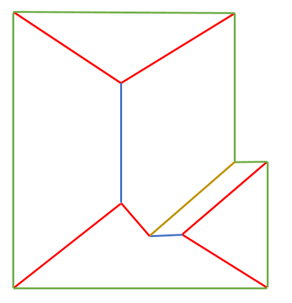I am creating an application using Google Maps Drawing Library. In the application the user can draw a bunch of PolyLines as shown in the picture below. Please disregard the color variation of polylines. Next i have to get the polygons from these polylines such that the polygons are valid and the polygons dont repeat. Is there a way that this can be achieved here is the basic code that i am following from google drawing
Note: It is the main requirement that the user should not be able to draw polygons I will deprecate the drawing controls button and add a new button that will only allow for line drawing.
Here is the code that I am following
<!DOCTYPE html>
<html>
<head>
<meta name="viewport" content="initial-scale=1.0, user-scalable=no">
<meta charset="UTF-8">
<title>Drawing Tools</title>
<script type="text/javascript" src="https://maps.google.com/maps/api/js?sensor=false&libraries=drawing"></script>
<style type="text/css">
#map, html, body {
padding: 0;
margin: 0;
width: 960px;
height: 700px;
}
#panel {
width: 200px;
font-family: Arial, sans-serif;
font-size: 13px;
float: right;
margin: 10px;
}
#color-palette {
clear: both;
}
.color-button {
width: 14px;
height: 14px;
font-size: 0;
margin: 2px;
float: left;
cursor: pointer;
}
#delete-button {
margin-top: 5px;
}
</style>
<script type="text/javascript">
var drawingManager;
var selectedShape;
var colors = ['#1E90FF', '#FF1493', '#32CD32', '#FF8C00', '#4B0082'];
var selectedColor;
var colorButtons = {};
function clearSelection () {
if (selectedShape) {
if (selectedShape.type !== 'marker') {
selectedShape.setEditable(false);
}
selectedShape = null;
}
}
function setSelection (shape) {
if (shape.type !== 'marker') {
clearSelection();
shape.setEditable(true);
selectColor(shape.get('fillColor') || shape.get('strokeColor'));
}
selectedShape = shape;
}
function deleteSelectedShape () {
if (selectedShape) {
selectedShape.setMap(null);
}
}
function selectColor (color) {
selectedColor = color;
for (var i = 0; i < colors.length; ++i) {
var currColor = colors[i];
colorButtons[currColor].style.border = currColor == color ? '2px solid #789' : '2px solid #fff';
}
// Retrieves the current options from the drawing manager and replaces the
// stroke or fill color as appropriate.
var polylineOptions = drawingManager.get('polylineOptions');
polylineOptions.strokeColor = color;
drawingManager.set('polylineOptions', polylineOptions);
var rectangleOptions = drawingManager.get('rectangleOptions');
rectangleOptions.fillColor = color;
drawingManager.set('rectangleOptions', rectangleOptions);
var circleOptions = drawingManager.get('circleOptions');
circleOptions.fillColor = color;
drawingManager.set('circleOptions', circleOptions);
var polygonOptions = drawingManager.get('polygonOptions');
polygonOptions.fillColor = color;
drawingManager.set('polygonOptions', polygonOptions);
}
function setSelectedShapeColor (color) {
if (selectedShape) {
if (selectedShape.type == google.maps.drawing.OverlayType.POLYLINE) {
selectedShape.set('strokeColor', color);
} else {
selectedShape.set('fillColor', color);
}
}
}
function makeColorButton (color) {
var button = document.createElement('span');
button.className = 'color-button';
button.style.backgroundColor = color;
google.maps.event.addDomListener(button, 'click', function () {
selectColor(color);
setSelectedShapeColor(color);
});
return button;
}
function buildColorPalette () {
var colorPalette = document.getElementById('color-palette');
for (var i = 0; i < colors.length; ++i) {
var currColor = colors[i];
var colorButton = makeColorButton(currColor);
colorPalette.appendChild(colorButton);
colorButtons[currColor] = colorButton;
}
selectColor(colors[0]);
}
function initialize () {
var map = new google.maps.Map(document.getElementById('map'), {
zoom: 16,
center: new google.maps.LatLng(52.25097, 20.97114),
mapTypeId: google.maps.MapTypeId.SATELLITE,
disableDefaultUI: true,
zoomControl: true
});
var polyOptions = {
strokeWeight: 0,
fillOpacity: 0.45,
editable: true,
draggable: true
};
// Creates a drawing manager attached to the map that allows the user to draw
// markers, lines, and shapes.
drawingManager = new google.maps.drawing.DrawingManager({
drawingMode: google.maps.drawing.OverlayType.POLYGON,
markerOptions: {
draggable: true
},
polylineOptions: {
editable: true,
draggable: true
},
rectangleOptions: polyOptions,
circleOptions: polyOptions,
polygonOptions: polyOptions,
map: map
});
google.maps.event.addListener(drawingManager, 'overlaycomplete', function (e) {
var newShape = e.overlay;
newShape.type = e.type;
if (e.type !== google.maps.drawing.OverlayType.MARKER) {
// Switch back to non-drawing mode after drawing a shape.
drawingManager.setDrawingMode(null);
// Add an event listener that selects the newly-drawn shape when the user
// mouses down on it.
google.maps.event.addListener(newShape, 'click', function (e) {
if (e.vertex !== undefined) {
if (newShape.type === google.maps.drawing.OverlayType.POLYGON) {
var path = newShape.getPaths().getAt(e.path);
path.removeAt(e.vertex);
if (path.length < 3) {
newShape.setMap(null);
}
}
if (newShape.type === google.maps.drawing.OverlayType.POLYLINE) {
var path = newShape.getPath();
path.removeAt(e.vertex);
if (path.length < 2) {
newShape.setMap(null);
}
}
}
setSelection(newShape);
});
setSelection(newShape);
}
else {
google.maps.event.addListener(newShape, 'click', function (e) {
setSelection(newShape);
});
setSelection(newShape);
}
});
// Clear the current selection when the drawing mode is changed, or when the
// map is clicked.
google.maps.event.addListener(drawingManager, 'drawingmode_changed', clearSelection);
google.maps.event.addListener(map, 'click', clearSelection);
google.maps.event.addDomListener(document.getElementById('delete-button'), 'click', deleteSelectedShape);
buildColorPalette();
}
google.maps.event.addDomListener(window, 'load', initialize);
</script>
</head>
<body>
<div id="panel">
<div id="color-palette"></div>
<div>
<button id="delete-button">Delete Selected Shape</button>
</div>
</div>
<div id="map"></div>
</body>

